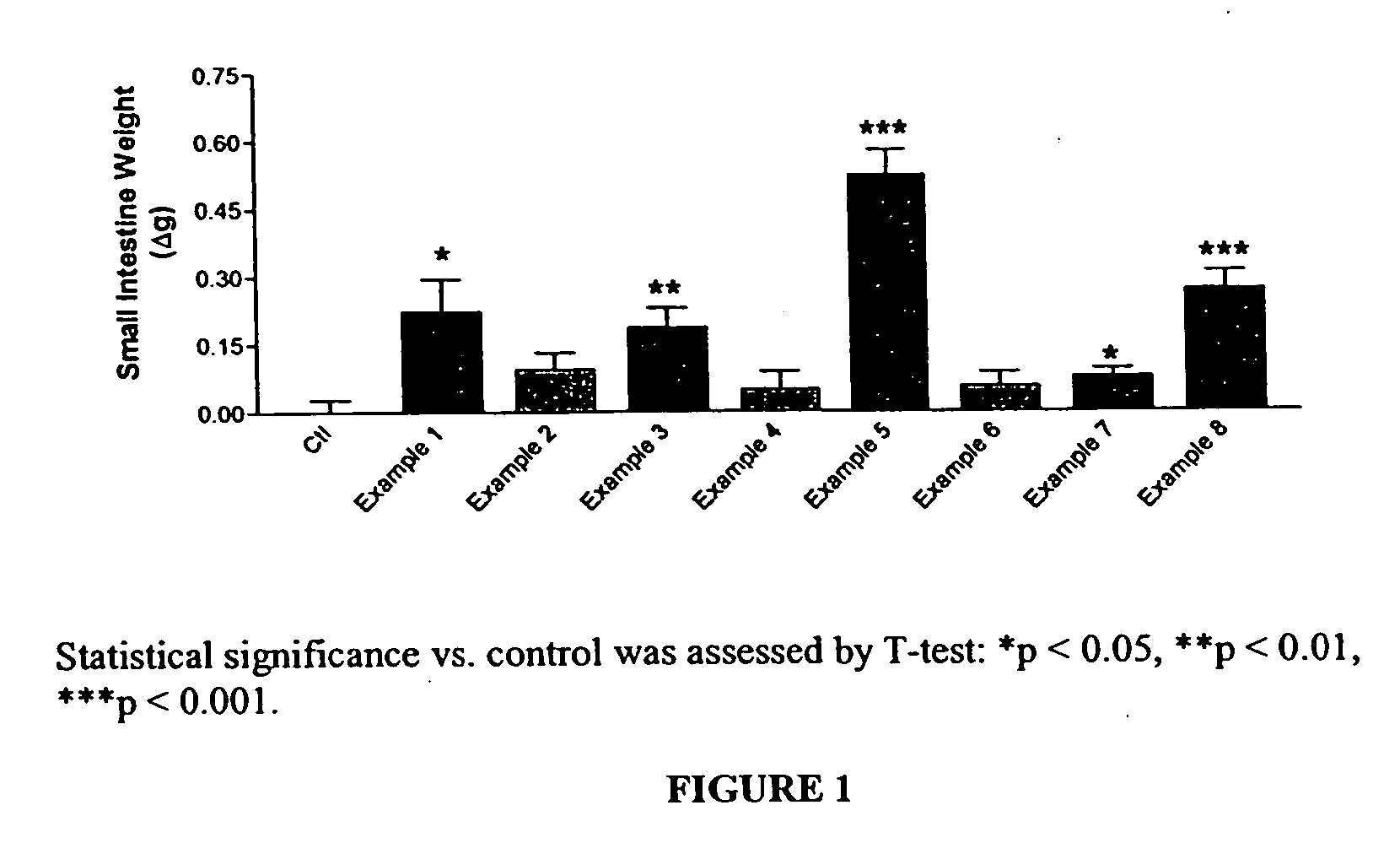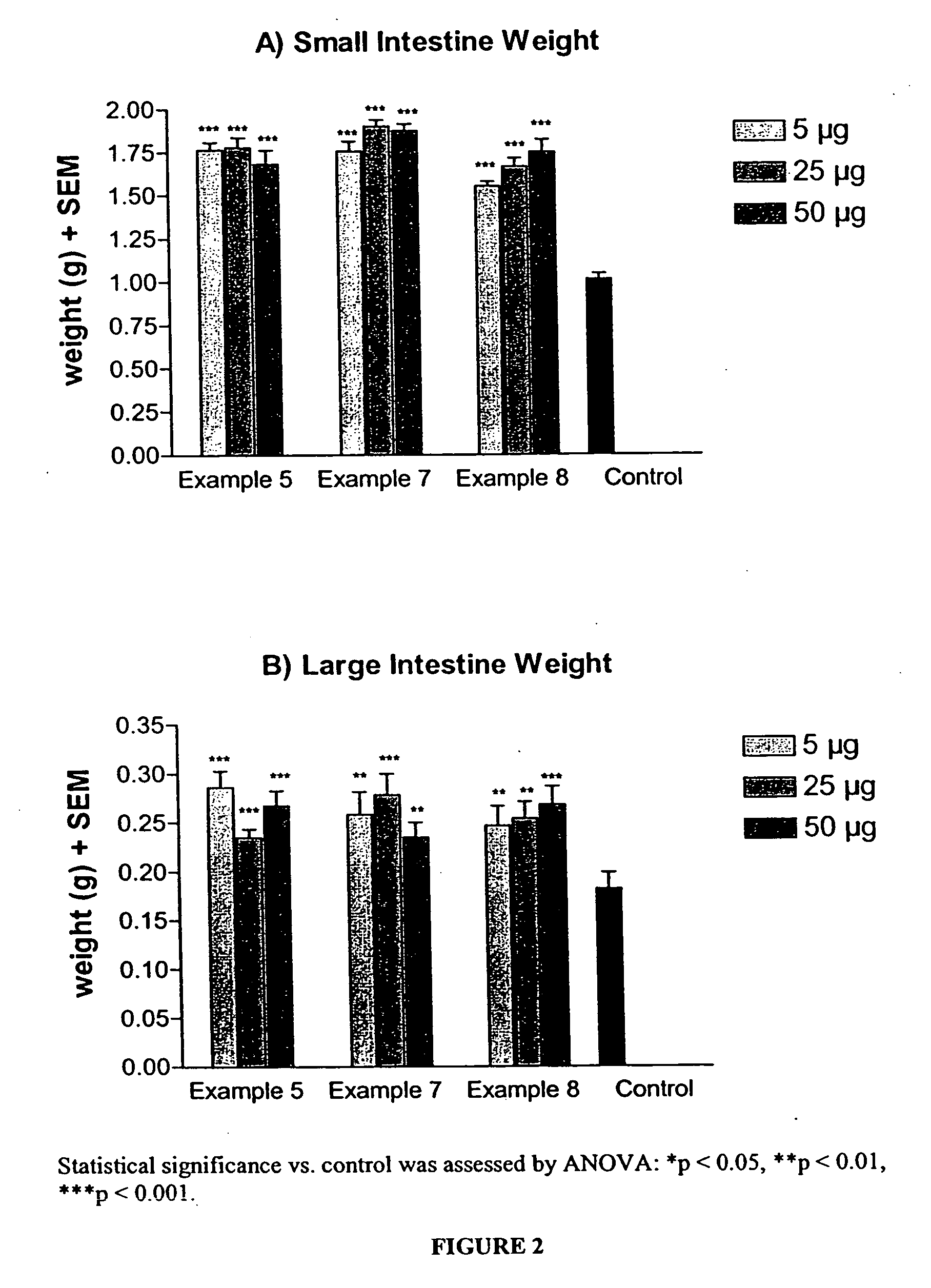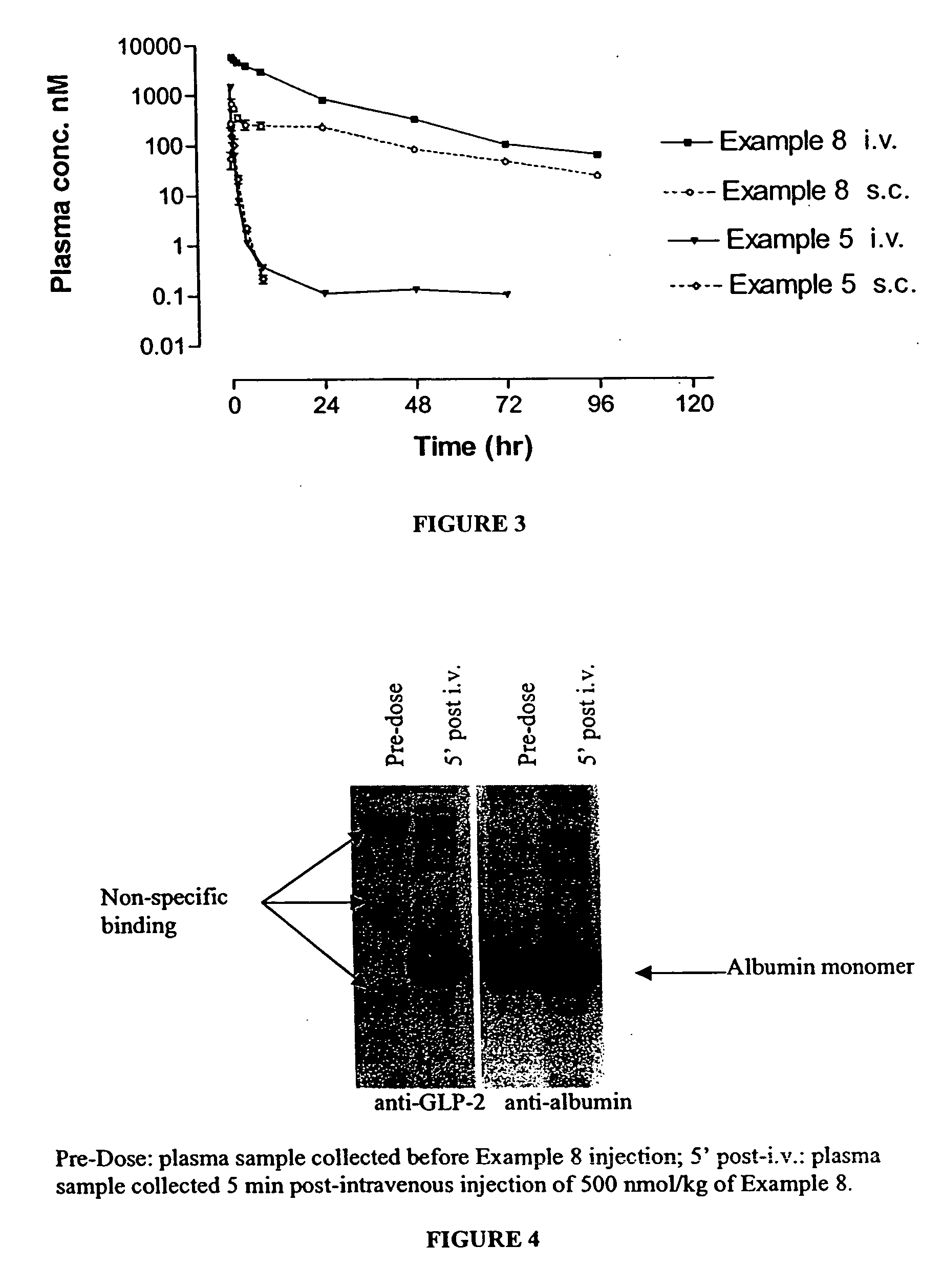Long lasting glucagon-like peptide 2 (GLP-2) for the treatment of gastrointestinal diseases and disorders
a glucagon-like peptide and long-lasting technology, applied in the field of glucagon-like peptide 2 (glp2) derivatives, can solve the problems of glp-2 peptides and analogs, their very short half-lives in vivo, and thus quite short half-lifes of glp-2, so as to prevent undesirable cleavage of glp-2 and extend its in vivo half-life and activity
- Summary
- Abstract
- Description
- Claims
- Application Information
AI Technical Summary
Benefits of technology
Problems solved by technology
Method used
Image
Examples
example 1
[0113] His-Ala-Asp-Gly-Ser-Phe-Ser-Asp-Glu-Met-Asn-Thr-Ile-Leu-Asp-Asn-Leu-Ala-Ala-Arg-Asp-Phe-Ile-Asn-Trp-Leu-Ile-Gln-Thr-Lys-Ile-Thr-Asp-CONH2
[0114] Step 1: Solid phase peptide synthesis was carried out on a 100 μmole scale. The following protected amino acids were sequentially added to resin: Fmoc-Asp(tBu)-OH, Fmoc-Thr(tBu)-OH, Fmoc-Ile-OH, Fmoc-Lys(Boc)-OH, Fmoc-Thr(tBu)-OH, Fmoc-Gln(Trt)-OH, Fmoc-Ile-OH, Fmoc-Leu-OH, Fmoc-Trp(Boc)-OH, Fmoc-Asn(Trt)-OH, Fmoc-Ile-OH, Fmoc-Phe-OH, Fmoc-Asp(tBu)-OH, Fmoc-Arg(Pbf)-OH, Fmoc-Ala-OH, Fmoc-Ala-OH, Fmoc-Leu-OH, Fmoc-Asn(Trt)-OH, Fmoc-Asp(tBu)-OH, Fmoc-Leu-OH, Fmoc-Ile-OH, Fmoc-Thr(tBu)-OH, Fmoc-Asn(Trt)-OH, Fmoc-Met-OH, Fmoc-Glu(tBu)-OH, Fmoc-Asp(tBu)-OH, Fmoc-Ser(tBu)-OH, Fmoc-Phe-OH, Fmoc-Ser(tBu)-OH, Fmoc-Gly-OH, Fmoc-Asp(tBu)-OH, Fmoc-Ala-OH, Boc-His(Boc)-OH. They were dissolved in N,N-dimethylformamide (DMF) and, according to the sequence, activated using O-benzotriazol-1-yl-N,N,N′,N′-tetramethyl-uronium hexafluorophosphate (HBTU) ...
example 2
[0116] MPA-His-Ala-Asp-Gly-Ser-Phe-Ser-Asp-Glu-Met-Asn-Thr-Ile-Leu-Asp-Asn-Leu-Ala-Ala-Arg-Asp-Phe-Ile-Asn-Trp-Leu-Ile-Gln-Thr-Lys-Ile-Thr-Asp -CONH2
[0117] Step 1: Solid phase peptide synthesis was carried out on a 100 μmole scale. The following protected amino acids were sequentially added to resin: Fmoc-Asp(tBu)-OH, Fmoc-Thr(tBu)-OH, Fmoc-Ile-OH, Fmoc-Lys(Boc)-OH, Fmoc-Thr(tBu)-OH, Fmoc-Gln(Trt)-OH, Fmoc-Ile-OH, Fmoc-Leu-OH, Fmoc-Trp(Boc)-OH, Fmoc-Asn(Trt)-OH, Fmoc-Ile-OH, Fmoc-Phe-OH, Fmoc-Asp(tBu)-OH, Fmoc-Arg(Pbf)-OH, Fmoc-Ala-OH, Fmoc-Ala-OH, Fmoc-Leu-OH, Fmoc-Asn(Trt)-OH, Fmoc-Asp(tBu)-OH, Fmoc-Leu-OH, Fmoc-Ile-OH, Fmoc-Thr(tBu)-OH, Fmoc-Asn(Trt)-OH, Fmoc-Met-OH, Fmoc-Glu(tBu)-OH, Fmoc-Asp(tBu)-OH, Fmoc-Ser(tBu)-OH, Fmoc-Phe-OH, Fmoc-Ser(tBu)-OH, Fmoc-Gly-OH, Fmoc-Asp(tBu)-OH, Fmoc-Ala-OH, Fmoc-His(Trt)-OH, MPA-OH.
[0118] Step 2: This step was performed in the same manner as step 2 of Example 1.
example 3
[0119] His-Ala-Asp-Gly-Ser-Phe-Ser-Asp-Glu-Met-Asn-Thr-Ile-Leu-Asp-Asn-Leu-Ala-Ala-Arg-Asp-Phe-Ile-Asn-Trp-Leu-Ile-Gln-Thr-Lys-Ile-Thr-Asp-Lys(MPA) -CONH2
[0120] Step 1: This step was performed in the same manner as step 1 of Example 1 above, 10 except that the first amino acid added to the resin was Fmoc-Lys(Aloc)-OH.
[0121] Step 2: The selective deprotection of the Lys (Aloc) group was performed manually and accomplished by treating the resin with a solution of 3 eq of Pd(PPh3)4 dissolved in 5 mL of C6H6 :CHCl3 (1:1): 2.5% NMM (v:v):5% AcOH (v:v) for 2 h. The resin is then washed with CHCl3 (6×5 mL), 20% AcOH in DCM (6×5 mL), DCM (6×5 mL), and DMF (6×5 mL).
[0122] Step 3: The synthesis was then re-automated for the addition of the 3-maleimidopropionic acid. Between every coupling, the resin was washed 3 times with N,N-dimethylformamide (DMF) and 3 times with isopropanol.
[0123] Step 4: The peptide was cleaved from the resin using 85% TFA / 5% TIS / 5% thioanisole and 5% phenol, follow...
PUM
| Property | Measurement | Unit |
|---|---|---|
| wet weight | aaaaa | aaaaa |
| wet weight | aaaaa | aaaaa |
| wet weight | aaaaa | aaaaa |
Abstract
Description
Claims
Application Information
 Login to View More
Login to View More - R&D
- Intellectual Property
- Life Sciences
- Materials
- Tech Scout
- Unparalleled Data Quality
- Higher Quality Content
- 60% Fewer Hallucinations
Browse by: Latest US Patents, China's latest patents, Technical Efficacy Thesaurus, Application Domain, Technology Topic, Popular Technical Reports.
© 2025 PatSnap. All rights reserved.Legal|Privacy policy|Modern Slavery Act Transparency Statement|Sitemap|About US| Contact US: help@patsnap.com



